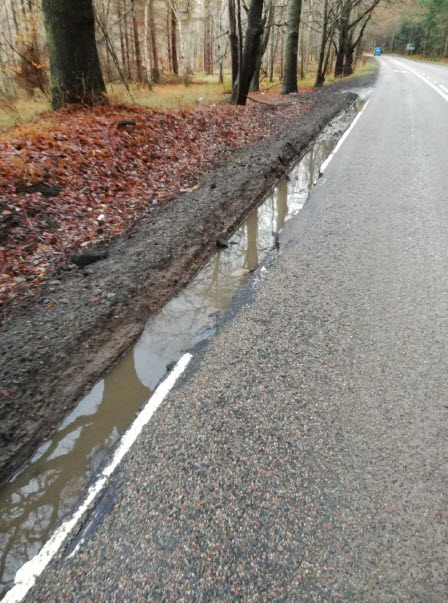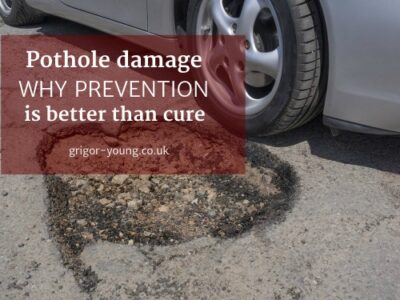Anyone who drives on the roads will know the juddering “crunch” that can come from hitting a pothole.
Whether it’s your own car, or a lorry from a haulage business’s fleet of vehicles, damage caused by a pothole in the road can be expensive, as well as annoying.
Potholes tend to appear most frequently during Winter but, of course, you need to be on the lookout for them at all times. In Moray, trunk roads, such as the A95 and A96, are the responsibility of BEAR Scotland. Other roads are within the remit of the local authority, The Moray Council.
If your vehicle suffers damage as the result of striking a pothole, you’ll want to consider the possibility of claiming back any repair costs from a third party, rather than claiming it off your own insurance (assuming you have comprehensive insurance).
How easy is it to succeed with a pothole damage claim?
These claims are not unwinnable, but they are difficult. You get a flavour of just how difficult they are if you consider The Moray Council’s response to a 2015 Freedom of Information (FOI) request about pothole compensation payments. You can see, from the way the request was framed, that the enquirer probably expected to expose a significant claims history, representing an important source of revenue loss for the Council.
I request the amount of money paid out in compensation to cyclists, pedestrians and vehicle drivers for damages caused by potholes in each of the last five years, with an annual breakdown for each group (e.g. Cyclists: Pedestrians: Vehicle Drivers: £10,000; £42,000; £31,000).
And the response?
2010: £250.00 (Driver)
2011: £178.50 (Driver)
2012: £322.69 (Driver)
2013: £0.00
2014: £0.00
So, while there will be administration costs for the Council in handling all pothole damage claims, even unsuccessful ones, these figures illustrate that the amount of compensation paid out for pothole damage claims over the 5-year period was negligible.
[NOTE: The link to the 2015 FOI request is no longer available but there is still much pothole damage information on The Moray Council website – see, for example, this PDF document which summarises the position over the period 2007 to 2020].
We go into the legal basis of these claims in more detail, below, but the austerity economics of the last few years have led to a general reduction in available resources for road management and upkeep. From this, there seems to follow an acceptance that roads authorities cannot be held responsible for the poor state of the roads if they don’t have sufficient funds to allocate to that area. Not only are these claims hard to win on the present law, it’s unlikely the law will change in the foreseeable future so as to make them any simpler.
How to make a pothole damage compensation claim
Some of the best guidance we have found is on the website of Money Saving Expert. They give a clear explanation of the legal basis of such claims. They also understand the fact that the relevant law is different as between Scotland and England.
The information they provide includes template letters you can use – for example, for a FOI request to the relevant roads authority.
You will need to gather evidence as quickly as possible after your accident, to include:
- The size and depth of the pothole,
- The length of time the pothole had probably been there and in that condition before your accident**,
- The roads authority’s policy on frequency of safety inspections at the locus and details of when the last pre-accident inspection took place, and
- Whether anyone had reported the defect to the roads authority before your accident and, if so, when that was.
The last 2 of these enquiries should be made via a FOI request.
**(Additional point: March 2024). On the subject of “length of time” the defect had been present before the date of your accident, note the following helpful pothole damage article by insurance lawyers, Clyde & Co, from March 2024.
In the case they report upon, they explain how they successfully defended a North- or North-East-Scotland Local Authority against a motorist’s appeal in a pothole damage claim. In other words, the driver’s claim failed but it sounds as though it may be because the driver tried to introduce (Google Streetview) imagery of the pothole ‘too late’ in the court appeals process and so the Sheriff Principal (of Grampian, Highland and Islands) refused to consider it.
Had the photos been relied upon at the initial Sheriff Court hearing, they may have been taken into account and the claim might have succeeded. Google Streetview has a feature whereby you can alter the date of the street view. By going progressively back in time, using this feature, you may be able to show approximately when a particular pothole or other road defect first appeared.
This may help you cast doubt upon any assertion that the local authority inspected the locus only shortly before your accident and found no defect. (In this case: accident – 22 December 2022; date of alleged inspection – 07 December 2022). Image of defect:

Why it’s probably not viable to use a solicitor
We have experience in dealing with personal injury claims, built up over many years.
Unfortunately, there is a clear distinction between, on the one hand, the economic viability of instructing a solicitor for a personal injury claim (which will almost invariably include some property losses) and a “pure” property loss claim (which is what most vehicle pothole damage claims are), on the other.
In relation to personal injury claims, whether the claim is settled by negotiation or following the raising of a court action, the recoverable expenses from the third-party insurers will either pay for the involvement of a solicitor entirely or, at least, substantially. This is why you see so many firms advertising “no-win-no fee” services for personal injury claims. There is an article on our Moray Claims website which explains in general terms how this sort of arrangement works.
By contrast, with “pure” property damage claims, there is no system whereby a solicitor can be paid a fee by the third-party insurer in addition to the compensation for the loss itself, certainly where the claim settles before any court action is raised. In theory, there would be some recoverable costs where court action has to be raised and it is successful, but the majority of claims for property damage will probably fall within the small claims limit (in other words, have a value of less than £3,000) and the recoverable costs in those circumstances are very limited (generally, not exceeding £300).
Again, you have to draw a distinction with personal injury claims because they are an exception to the small claims regime: a claim for personal injury is never a small claim under Scots law and so, from the point of view of employing a solicitor, the level of recoverability of costs is “workable” even for quite low value personal injury claims.
Pothole accidents leading to personal injury
In 2011, Martyn Uzzell was taking part in a charity bike ride from Land’s End to John O’Groats with two friends. As they were cycling on the A65 in North Yorkshire, Mr Uzzell hit a pothole in the road and was thrown from his bike into the path of an oncoming vehicle. He died as a result of the collision.
In an out-of-court settlement with Mr Uzzell’s widow, Kate, expressly without admission of liability, North Yorkshire County Council are understood to have paid a six figure sum in compensation. There was apparently evidence that the pothole had been reported to the council by the police, but the message had been lost. Furthermore, the council had allegedly inspected the road, noted the defect and ordered it to be fixed within one month. In short, the council had possibly missed opportunities to repair the pothole before Mr Uzzell’s accident.
Though this was an accident in England and the law on liability is different to that in Scotland, in principle, the same sort of claim could succeed in Scotland. Where an accident results in personal injury or death, rather than minor property damage only, it is going to be economically viable to engage a solicitor to advise you and help you investigate the prospects of success.
Summary
Most pothole damage compensation claims are doomed to failure, though you will maximise your chances of success if you gather the necessary evidence as soon as possible after the accident. From a risk management point of view, given that the state of the roads is not improving and we are all likely to suffer this kind of vehicle damage sooner or later, it’s best to check your insurance cover and opt for comprehensive insurance, if you can afford it. And drive carefully …
How we can help
If you have any questions about this article or any aspect of our personal injury claims services, please do not hesitate to contact us.
You can call on 01343 544077 or send us a Free Online Enquiry.
All initial enquiries are free of charge and without obligation.


 Family Law Guide Helps Moray Consumers
Family Law Guide Helps Moray Consumers